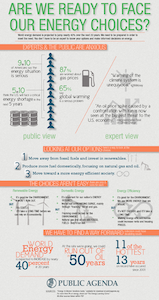 The presidential election is less than two weeks away and although the candidates have discussed energy, neither has debated over the right strategy for global climate change. Our legislators also typically fail to consider the consequences of actions they endorse. Therefore, according to Public Agenda, if the country hopes to move the needle on important issues, such as energy, voters need to understand what’s really at stake.
The presidential election is less than two weeks away and although the candidates have discussed energy, neither has debated over the right strategy for global climate change. Our legislators also typically fail to consider the consequences of actions they endorse. Therefore, according to Public Agenda, if the country hopes to move the needle on important issues, such as energy, voters need to understand what’s really at stake.
Issue one: according to research, nearly half of all Americans cannot identify a renewable energy source and almost 4 in 10 cannot name a fossil fuel. So for those ready to learn something new, or just want to rethink the issues surrounding energy policy, Public Agenda has released an interesting free guide, “A Citizens Solutions Guide Energy.”
I found the guide interesting. It establishes where the globe is at today and what global energy needs are predicted to be in the future. Then it discusses “things we do know”. This includes: the U.S. population is growing and the country’s energy consumption is growing as well; world energy demand is expected to increase by nearly 40 percent; most of our energy, 83 percent, comes from fossil fuels; and renewable energy has serious fiscal drawbacks – and we’re nowhere near ready to depend on it at a substantial level.
The guide provides energy tradeoffs, but I did note the only category with costs was renewables. Despite the fact that petroleum, natural gas, nuclear and coal have been around for decades, there is still a costs associated with them. Keep this in mind moving forward. The guide presents three possible approaches to consider and include arguments for and against each approach:
- Approach 1: Move away from fossil fuels as quickly and as safely as we can. This will protect the environment and in the long run will give us cheaper and more reliable energy sources.
- Approach 2: Make sure we have enough affordable energy now to support our economy and ensure our energy security.
- Approach 3: Move toward a more energy efficient society.
While I agree with much of the information provided in the area, there are also areas I don’t agree with. But this is good because the guide achieved its goal – made me think more intelligently and in-depth about energy policy. Let’s hope I don’t forget what I’ve learn before I hit the polls.

